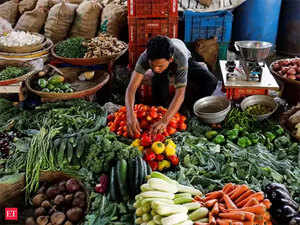 Agencies
Agencies“ Our extensive interactions with various agri-supply chain players (farmers, agri-mandi dealers, etc.) indicate a limited adverse impact on Rabi crop realisations if the lock-down is lifted by mid-Apr’20, as most crops would trade subsequently and agri supply-chain functioning is ensured and enforced across states,” a research note from JM Financial.
It added: “As we saw in the months after Demonetization, small & marginal farmers usually bear the brunt of price declines, while large farmers with holding capacity can limit their losses. We expect food inflation to come in at sub-4% levels by Jun’20.
Agri-income growth in FY20 should drop to at best low single digit levels (despite our earlier conservative estimates), given the current lock-down and market disruption. A key positive however remains healthy reservoir levels (53% against the 10-year average of 35%) and a likely normal monsoon in CY20, ensuring continued agri-related investments.“
Non-agri income growth was already weak and will be further challenged in the absence of any large support/program by the government. Postponed weddings (in Apr- May’20) and deferred festival-related spending are likely to further impact discretionary consumption, while spending on staples benefits from higher stocking in the period of lock- down.
Rabi sowing is up 10% YoY, with higher sowing area across crops, barring oilseeds. “Our interactions with farmers across states indicate a robust upcoming Rabi crop with limited adverse impact from unseasonal rains (e.g. mustard in Haryana and Punjab). Harvesting in the last few days has been aided by using labour from local villages. Now, with a nation-wide lock-down, harvesting would be delayed by a few weeks.
However, the key concern in rural India is not output, but marketing for their produce. Therefore, a smooth agri-supply chain function (production, mandi, trading, transportation, etc.) across states needs to be enabled, in the absence of which, perishables (fruits & vegetables) in particular would suffer the most,” the note highlighted.
The spread of Covid-19 and fall in crude oil prices has brought down the prices of several agri-commodities by 20-30% globally in the last two months. “While we do not expect a steep decline in the prices of agri-commodities in India, some segments such as perishables (part of horticulture), milk (lack of bulk buying from businesses) and poultry/eggs (lower demand due to falsely-attributed fears) could see price declines. We do not yet expect food inflation to slip into a negative territory as it would be supported by prices of cereals, pulses and some vegetables (potato and onion) over the next few months. We expect overall food inflation to trend under 4% over the next six months, which would give the RBI a headroom for rate cuts,” the study showed.
The nation-wide lock-down and subsequent challenges in agri-marketing are likely to take a toll on rural income growth. “As highlighted earlier, non-agri income growth was already muted because of a weak real estate environment, a drop in economic activity and now a nation-wide lock-down; therefore, rural wages could suffer.
While we expect a financial package/scheme from the government for the rural population in coming days, measures such as allowing up to six months of monthly allotments from PDS to be taken upfront, could help the poor. The proposal (yet to be implemented by states) would also ensure that the high storage levels at the FCI are managed in time for the next round of wheat procurement (likely after the current lock-down is lifted),” noted JM Financial study.
Read More News on
Download The Economic Times News App to get Daily Market Updates & Live Business News.
Subscribe to The Economic Times Prime and read the ET ePaper online.
Read More News on
Download The Economic Times News App to get Daily Market Updates & Live Business News.
Subscribe to The Economic Times Prime and read the ET ePaper online.









 Get Unlimited Access to The Economic Times
Get Unlimited Access to The Economic Times
